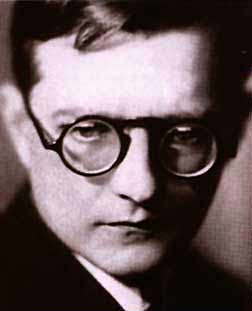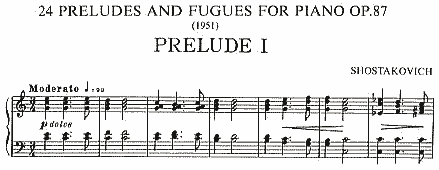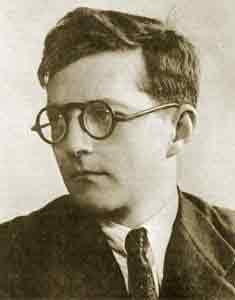Rene and Georgette Magritte,
With their dog after the war,
Returned to their hotel suite
And they unlocked the door.
Easily losing their evening clothes,
They dance by the light of the moon
To The Penguins,
The Moonglows,
The Orioles,
and The Five Satins,
The deep forbidden music
They'd been longing for.
Rene and Georgette Magritte
With their dog after the war.
-Paul Simon

Dimitri Shostakovich
When it comes to music, my
tastes are purely plebian. Appreciation of classical music, just like that of
chess, is partially dependent on a certain level of education in that area, or,
in the least, greater understanding leads to greater appreciation. Appreciation
of the historical significance requires much less commitment. That's my cue.
Among my favorite books on chess history are those by Genna Sosonko
who wrote predominately about Soviet chess players, mostly in the post-Stalin
era. There's something about the paradox of creativity in a repressive society
that gives his stories a poignancy most other chess stories lack. During the
Stalin years things were exponentially worse and the juxtaposition of creative
minds against such a backdrop is especially stark. Whether it's chess, music or
literature, there's a yearning for truth and beauty that transcends any societal
restrictions, but in a society that demands conformity to official doctrines,
the paths to truth and beauty can often be quite subtle and convoluted.
Dimitri Shostakovich is considered by some to be the greatest of Soviet
composers. Forced to strive under that paradox where the state demands great
results but, at the same time, fetters the the creative process and dictates the
acceptable expression of that process, it's quite possible that Shostakovich, as
with other Soviet artists who served the State as well as Art, was compelled to
reach even deeper inside himself and produce greater work than he might have in
a freer society.
Shostakovich's relationship with chess was
far more casual than that of Prokofiev or Oistrakh, but it's certainly worth
noting especially since his Waltz No. 2 from Jazz Suite No. 2 is featured
in the Nabokov-inspired chess film, The Luzhin Defence, and appears as
two separate tracks on the soundtrack album.

My schizophrenic ramblings above, hopefully, serve as counterpoint to the more
structured and formal article documenting Shostakovich's chess play by Lawrence
Totaro of
Ultimate Chess Collecting below.

Dimitri Shostakovich
September 25 [O.S. September 12] 1906–August 9, 1975
Shostakovich: A Life. Contributors:
Laurel E. Fay - author. Publisher: Oxford University Press.
Place of Publication: Oxford. Publication Year: 2000.
Page 31
The year 1926 began auspiciously. On New Year's
Eve, Shostakovich dreamed that he was walking in a desert when suddenly an
old man appeared before him and predicted that he would have a lucky year.
Shostakovich resolved to finish his Second Symphony quickly; he claimed he
could already hear the whole work in his head. He also kept himself busy
correcting the parts for his First Symphony and gratifying a passion for
chess.
Page 110
Shostakovich was not a man who suffered idleness
or boredom well; he appeared a bundle of nervous energy, given to restless
fidgeting and squirming. From his mother he inherited the penchant to wile
away idle moments laying out games of solitaire. He was not driven solely
by artistic pursuits. From childhood, he was an indefatigable reader of
fiction, classic and contemporary. Chess was chiefly a youthful
infatuation; although he followed match play, he was never
as serious a competitor as Prokofiev or David Oistrakh. In old age one of
the favorite yarns he liked to retell was how, as a callow teenager, he
had challenged and lost to Alexander Alekhine, 7 something
which could have taken place only before the future world champion left
Russia for good in the spring of 1921. Shostakovich enjoyed billiards and
cards, and during the 1930s he played poker regularly.
(Footnote 7 reads: M. Dolgopolov, "Budem
znakomď--Alekhin...," Izvestiya, 17 August 1974, 5. Among
others who recall hearing the composer recount versions of this story are
Yevgeniy Dolmatovsky and Mstislav Rostropovich.)
Page 111
Reflecting an actuarial streak in his nature,
Shostakovich maintained a neat log of soccer scores inscribed in a
notebook--championship play arranged in pyramids--for many years both
before the war and after. (He used the same notebook to log the results of
chess tournaments, to inscribe his worklist by opus number, and, at least
initially, to catalogue the scores in his library. 17 ) Soccer
offered Shostakovich an escape, both from music and from the cares of
daily life.
(Footnote 17 reads: This notebook is preserved in
the Shostakovich family archive.)
Page 273
At home, Shostakovich barely had time to unpack
before he and Irina were off to Leningrad to board the Baltika, sailing on
31 June on a roundtrip voyage to England. The composer was an honored, if
undemanding, guest on board ship. One of the crew recalled that his only
special request was for the repair of his old transistor radio; he wanted
to follow the progress of the Spassky-Fischer chess championship set to
get under way in Reykjavik. 41
(Footnote 41 reads: Ye. Kunitsďn, "Pamyatnďye
vstrechi s Dmitriyem Shostakovichem," Sovetskaya kul'tura
(26 September 1978): 8. As it turned out, the opening game of the chess
tournament was postponed from
3 until 11 July 1972, long after Shostakovich had disembarked.)
Is there any record of exact correspondence between
Alekhine and Shostakovich? Did they ever play more than once as stated above
and can any reader identify the game between the world champion and the
composer? [L.T.]
From page 118 of SHOSTAKOVICH: A Life
Remembered by Elisabeth Wilson, it reads:
“Shostakovich was a man who, for the sake of a
good story, could so far as to invent a tale. For instance, to this day I
don’t give much credence to some of his stories. To of them he used to
tell me regularly, maybe twice a year. One was about how, when a young
boy, he met the chess-player Alekhine in the cinema. There was nobody
around and, Dimitri Dimitriyevich, who didn’t recognize Alekhine
approached him and asked him for a game. I don’t believe this story,
particularly, as I then had occasion to recount it to Boris Spassky.
Spassky said that Shostakovich would have had to be very young indeed as
Alekhine left Russia 1919 or 1920.” (Recorded interview with Mstislav
Rostropovich and Elisabeth Wilson)
|
|

